In Rajasthan’s remote villages with no schools or electricity, two young engineers educate children with iPads and digital technology, instilling in them a dream of a better tomorrow, reports Manu A B.
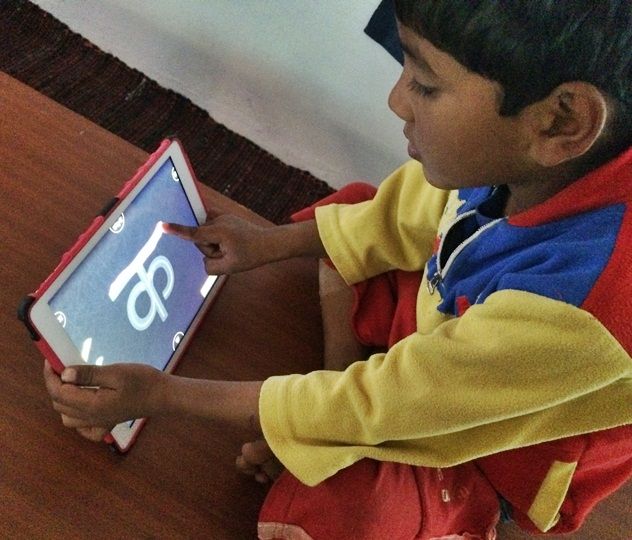
As the sun sets in Patan village, in Ajmer district in Rajasthan, weary children make their way through the muddy pathway in the dark to attend night school.
Tired after a day’s hard labour in the fields, these children stare at the dark blackboard, which hardly makes any impact in educating them.
The night school, which begins at 6 p.m. and ends by 9 p.m, had become a punishment for these poor children who help their parents in the fields the whole day in the scorching summer heat. Gradually, they started leaving this informal school. However the bad times did not last long.
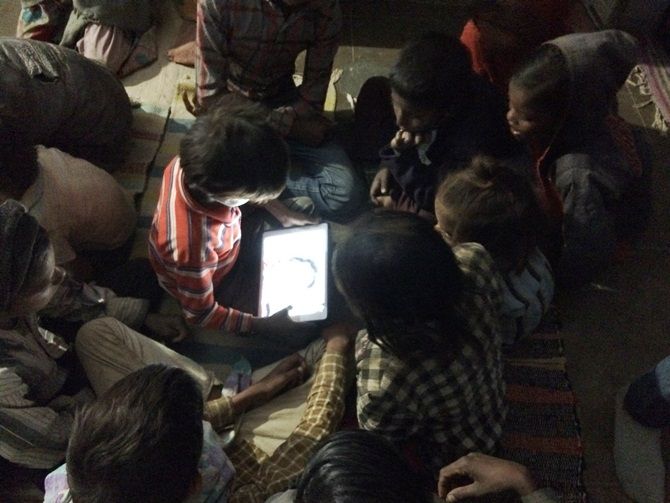
Soon, their school turned into a lively and bustling place, bringing out the best in them.
Today, instead of old and torn notebooks, they carry the latest iPads, which have transformed their outlook and approach towards education.
This has been possible thanks to the relentless efforts of two young engineers - Kirubhagar and Harsh Tiwari who took up SBI’s Youth for India fellowship to bring about a change in the neglected education space in rural India.
Kirubhagar whose name means ‘blessing’ has lived up to it - he is indeed a blessing for many children.
After completing mechanical engineering from SRM University, Kirubhagar turned down offers from multinational companies (MNCs) and went against his parents’ wishes, in his pursuit for solving ‘real life’ problems.
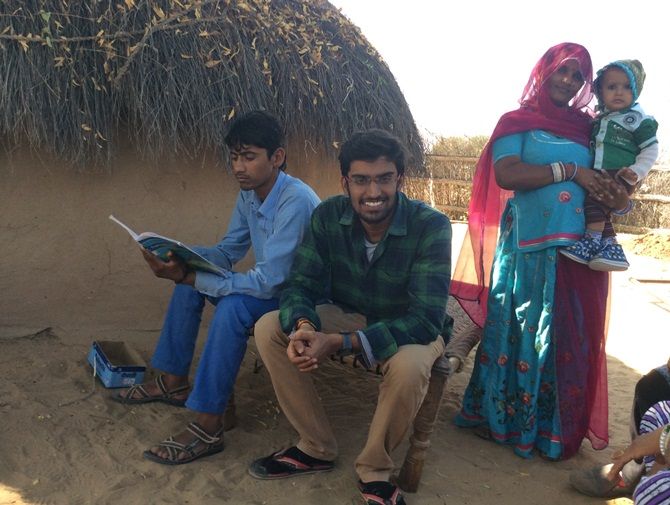
Harsh Tiwari, an electrical engineer from Birla Institute of Technology, quit a well-paying job at IFB Industries to work in remote villages of India and develop low-cost solutions to tide over the power crisis and educate children.
Today, for children like 10-year-old, Ramji belonging to the poor Bagaria and Bhil community, Kirubhagar and Harsh are role models.
These two engineers with the help of the NGO, Barefoot College, have transformed the way children learn and get information by setting up digital night classes.
In the dimly lit corner of a classroom in Guwadi village which has no electricity, Ramji is busy flipping pages on his iPad.
As his parents look at him and the ‘wonder’ device, Ramji explains the subjects he learnt with ease to his uneducated parents.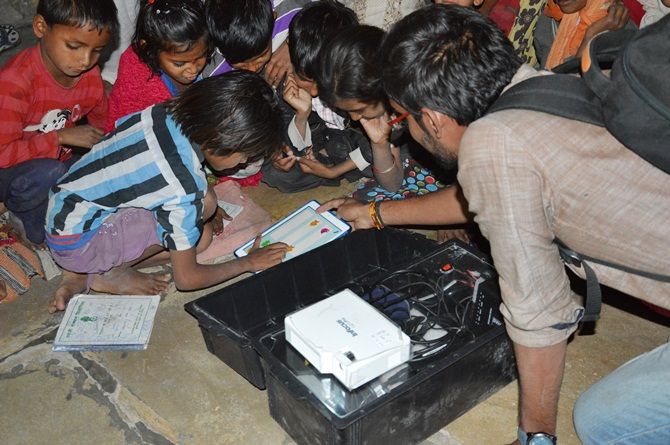
He tells his parents about the importance of agriculture, the best farming methods and ways to take care of their cattle too. As subjects they learn are related to their life, it makes learning useful and productive.
“In such informal schools where you have children from the age of 5-15 years, the traditional ‘chalk and board’ method had no impact. I realised that we had to devise a cost-effective, user-friendly solar powered projector to make teaching an enriching experience,” says Kirubhagar.
The conventional projectors available in the market were power guzzlers and thus not cost-effective.
Kirubhagar spent over 4 months to innovate and build the prototype of a solar powered projector, which could work seamlessly in any remote village.
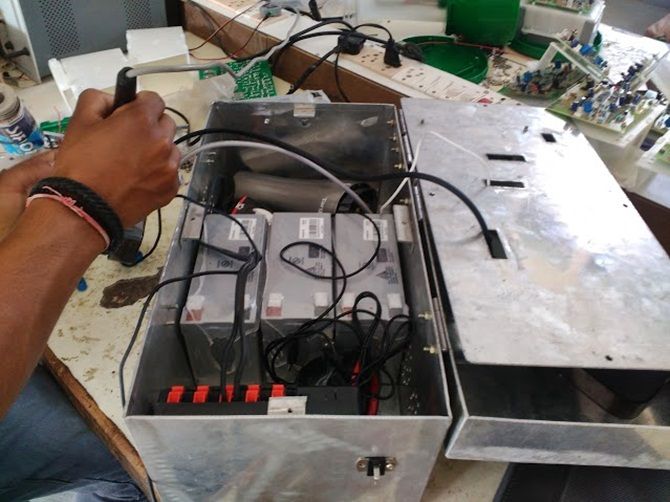
Much cheaper than the conventional projectors, the product has inbuilt speaker, battery backup for 3 hours and can sync with a tablet wirelessly and also has the best brightness to power consumption ratio.
While the conventional projectors along with speakers and battery cost up to Rs 150,000, Kirubhagar’s solar projector was built with Rs 80,000. Kirubhagar plans to file a patent for the innovative device soon.
"This projector weighs approximately 8.5 kg whereas the combined weight of the projector, battery and speakers will add up to 15 kg in a traditional setup," explains Kirubhagar.

Kirubhagar’s solar projector and Harsh’s idea of syncing them with the iPads was a major breakthrough in the success of the digital education programme.
“We found that it was a major challenge to get students to school every day. Even if they came, to ensure that they attended classes regularly was another big task. As parents see no point in education, many children are forced to stay back at home. Interestingly, the teacher is selected from the community, who is also a school dropout,” explains Harsh.
The introduction of a novel way of teaching was imperative to attract students, who were eager to learn and to convince parents to send their children to school.
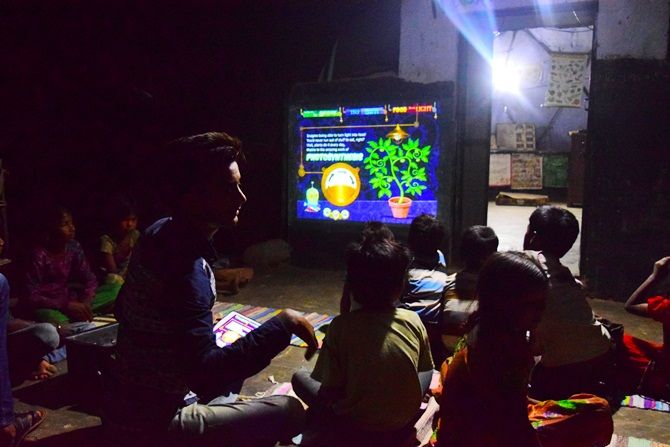
With the iPad synced to the projector, the teacher could present concepts in maths and science in an interactive manner with the help of pictures, videos and apps. So initially the teacher had to be trained on the new curriculum. Teaching concepts like photosynthesis became uncomplicated in the new system.
As the classes became interesting, children started coming to school on time. They could understand the concepts better. Even parents started visiting the class and paid attention to what was being taught.
The fact that iPads were used increased their attention span and it also gave them a sense of pride to do things which they could never imagine before.
With the iPads, these children could do their homework and submit it. The teacher now does not have to carry their books, instead just needs to check it on his iPad.
The pace at which some kids picked up information using the apps and the iPad amazed Harsh and Kirubhagar.
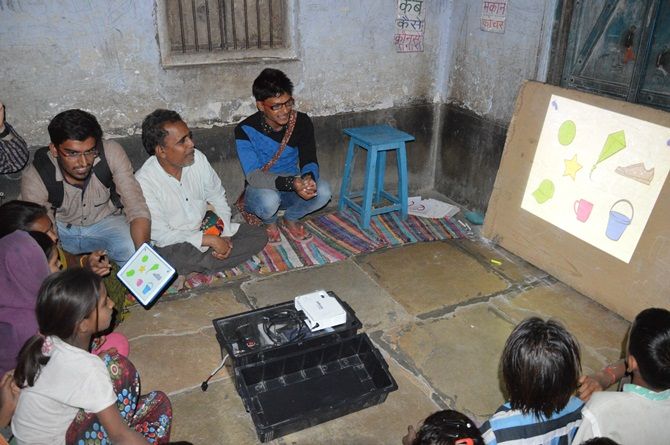
“The teacher could open the world to them with the help of the iPads. Initially it was difficult to convince the teacher to use the iPad. The curriculum was then revised to prepare the children to be at par with students of other government run school far away from these villages,” says Harsh.
Today around 30 children attend school regularly. The fact that we could achieve a regular attendance was itself impressive. During the periodic assessment, children scored much better as well.
The initial days were very difficult for Kirubhagar and Harsh. It took them days and weeks to convince parents to send their children to school.
Training the teacher to make him understand how the system works and how it would enhance the quality of education was really tough.
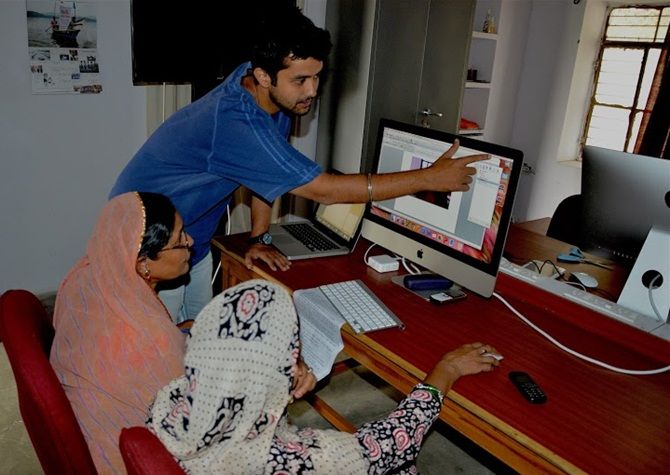
As temperatures soared, Harsh and Kirubhagar continued to brave the heat, walk miles across villages to reach out to the villagers. Many a time they had to sleep outside the house as the heat was unbearable at night.
Though they were skeptical about how they could adjust in such situations, they managed to tide over all crises without much difficulty as the mission was more important.
“In villages, the parents do not see any merit in sending their children to school as they need help at home and in the fields.
They do not trust outsiders but the fact that children started learning fast made the parents realise the importance of education.
It has now turned out to be a collective effort with parents appreciating their efforts and offering their ideas as to how education can be made helpful to them in real life too,” says Harsh who also set up an IT centre in the Bagariya village.
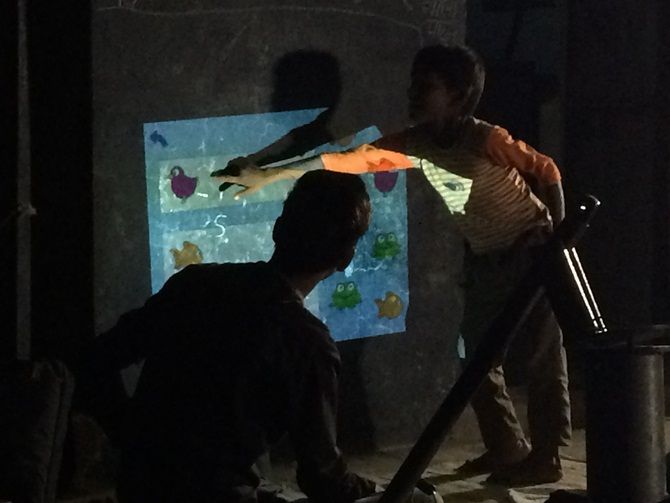
Many of these children are very creative and fast learners. However their potential and talent is being wasted without the right opportunities.
The success of the night school experiment in Patan with the help of the solar projector and iPads has prompted Barefoot College to extend support to Harsh and Kirubhagar to start new schools in 5 remote villages in Rajasthan, Bihar and Karnataka.
Harsh is now actively involved in setting up schools in Guwadi (Sikar district) and Bisaniya (Barmer District) a remote village around 80 kilomteres from the India-Pakistan border.
As the solar projector and iPads turn out to be most attractive part of the curriculum and the learning process, Barefoot College now plans to apply this winning formula across 47 existing night schools in Rajasthan and Bihar.
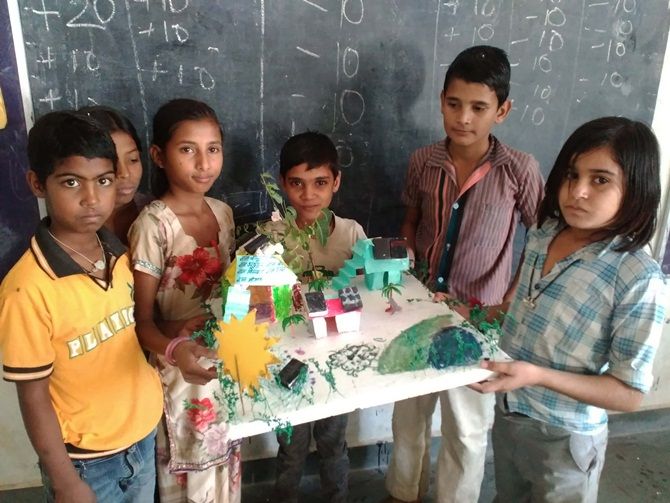
“In a village, where the majority is illiterate, no one has even studied till tenth standard, now there is hope. We hope some of these children will complete grades 1-5 in the night school and join the formal school from sixth grade onwards,” says Harsh optimistically.
Though both of them had many apprehensions before they took up the SBI fellowship, today, the satisfaction they have is something no corporate job can offer.
The experience has changed my perspective of working. No salary package or perks can give the satisfaction of brining a difference to people’s lives.
There can’t be anything more beneficial than imparting knowledge and educating the poor, says Kirubhagar, whose parents now appreciate his work and believe in his social commitments.
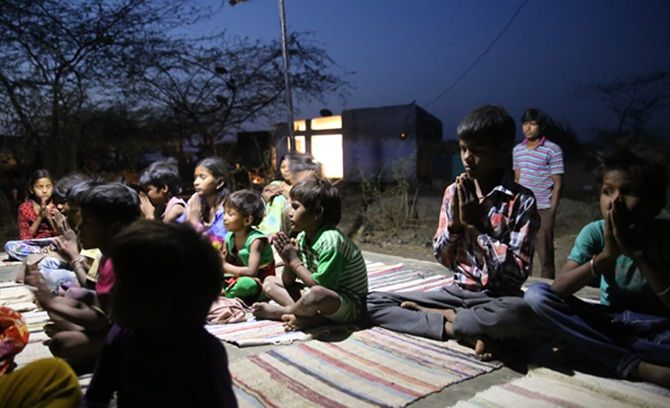
Even after the 18-month SBI fellowship, Kirubhagar and Harsh plan to remain committed to work in the area of renewable energy, providing solutions that make lasting impact in the lives of the poor people, who have no access to even the basic facilities’ they deserve so much.
Harsh too agrees that every Indian must atleast devote one year towards working for such social causes. Harsh is also part of a mission to bring electricity to 1,100 houses in remote villages of Rajasthan, Bihar and Karnataka.
“We go through real life problems and situations and are able to offer the best possible solutions. When you see the results are transformational, it is worth every trouble.
This the best work and personal experience one can get. The kind of exposure you get opens up your mind and the experience creates lasting impressions,” says Harsh who wishes to continue in the social sector giving a fillip to projects in the digital education space and solar electrification of villages.
He feels it is a privilege to work with Barefoot College started by Bunker Roy, who inspires them to achieve higher goals.
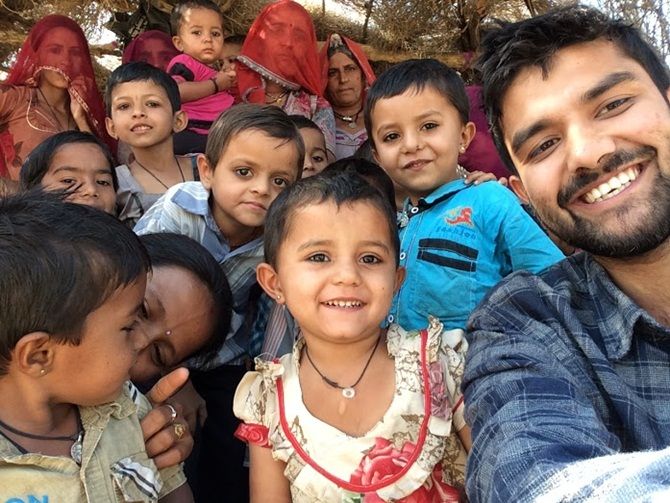
To top it all, the smiling faces of kids and their love is a priceless gift, feels Harsh.
After three months in the village, Harsh was taking a few days off to visit his parents. As he was about to get into the car, a boy from the night school in Tilonia, Dev, just took away his bag and started running away, much to his surprise.
The boy did not want him to leave as he wanted to study every day. Incidents like these further boosted his morale to work wholeheartedly for underprivileged children.
Harsh and Kirubhagar will continue their work to light up the lives of people across villages and are keen to expand the scope of their work to impact more children across rural India.
If you would like to help Harsh and Kirubhagar in their efforts, you can mail them at harshtiwari_31@hotmail.com and kirubhagarb@gmail.com









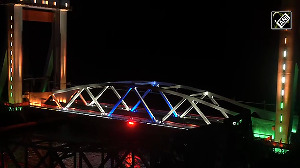
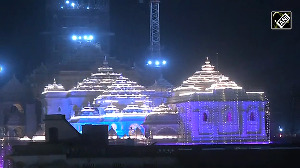
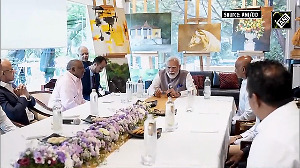
 © 2025
© 2025